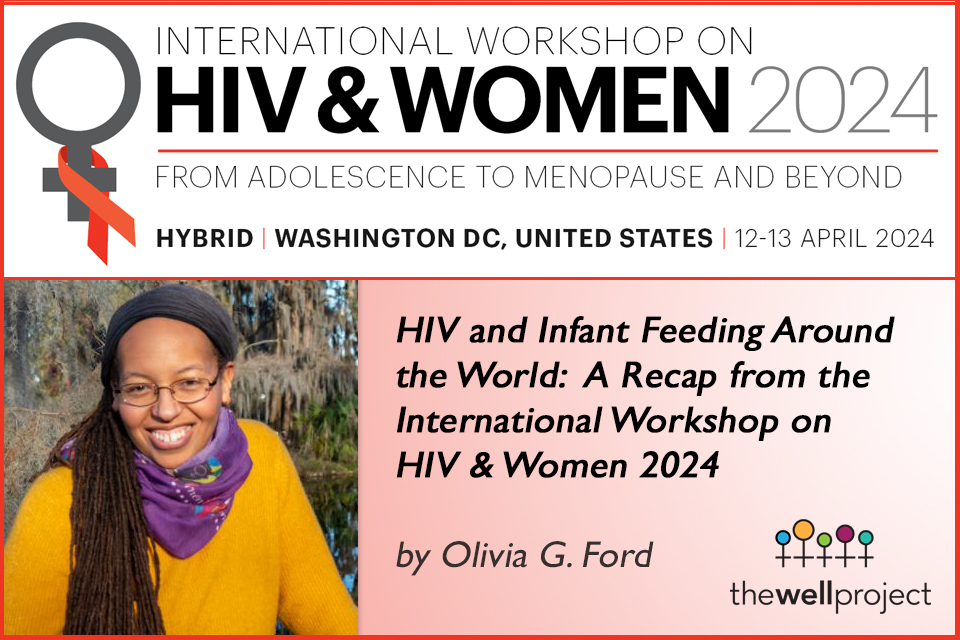
By Olivia G. Ford
Several members of The Well Project's team observed the April 2024 International Workshop on HIV & Women, from on the ground in Washington, DC, as well as virtually. Read on for this author's take on some of the information presented.
Last year's International Workshop on HIV & Women (IWHW) 2023 in Seattle, Washington, took place as advocates, supportive clinicians, and prospective parents living with HIV were celebrating sweeping updates to the US guidelines on infant feeding and HIV – and heralding similar changes in other high-income regions. A poster copresented by The Well Project, as well as other sessions at the gathering, touted those updated US guidelines. During one of these, colleagues attending the conference from lower-income areas relayed their chagrin that countries like the US had taken so long to make these life-saving modifications to their guidelines. Conversely, clinicians in countries like South Africa have supported thousands of clients living with HIV and taking HIV treatment to breast/chestfeed over many years – in challenging circumstances, with great success in avoiding HIV transmission on treatment, and with little recognition for this work.
We have said this before... Data from Africa is data and needs to be used for what it is. It works and has worked and this should be trusted already. It's not less than data... https://t.co/eVd2x0dnbV
— Lucy Wanjiku Njenga (@LucyWanjikuN) February 18, 2023
Among them was Natasha Davies, MD, a physician from Johannesburg, South Africa. Davies was inspired by the experience at IWHW 2023 to spearhead INFORM+ (International Feeding Choices Forum for People Living with HIV) to foster collaboration, knowledge exchange, and research initiatives among colleagues from different countries; The Well Project's Ciarra "Ci Ci" Covin and myself, who were in the room at IWHW 2023, became early members.
Davies works with the Anova Health Institute in three clinics in Johannesburg, often with women living with HIV who are not virally suppressed during their pregnancies. She has seen, in numerous cases, that when women are listened to and supported in meeting their needs around HIV treatment adherence, they can achieve and maintain viral suppression and avoid vertical HIV transmission, even in challenging circumstances like sky-high viral loads and adherence issues due to being unhoused.
At IWHW 2024 this year, Davies delivered an impassioned, informative, and provocative presentation titled "Infant Feeding Choices for Parents Living With HIV: Updates From the INFORM+ Forum Group." In her talk, she briefly recounts the 2023 interaction; then, through the lenses of published data as well as exhaustive anecdotal evidence from numerous experiences with parents, she unfurls a powerful case for providers to build trust with parents living with HIV by providing full information, uncoerced choice, and unqualified, unswerving support. She even provides insight into the PROMISE studies – including the two HIV acquisitions through breastfeeding that occurred when the moms were believed to be virally suppressed.
Watch the video of Davies' full 20-minute presentation below
More from The Well Project on the International Workshop on HIV & Women 2024 (IWHW 2024)
- Alabama-Based HIV Researchers Discuss Care and Prevention Concerns: A Recap from the International Workshop on HIV & Women 2024 by Katie Willingham
- Debating the Role of HIV Treatment in Hypertension: A Recap from the International Workshop on HIV & Women 2024 by Katie Willingham
- The International Workshop on HIV and Women by Katie Willingham on A Girl Like Me
- Shedding Light on Menopause and HIV: A Recap from the International Workshop on HIV & Women 2024 by Katie Willingham




